Massachusetts Senator Elizabeth Warren, long dubbed “anti-crypto” by industry executives, has gained a common cause with the crypto sector: fighting banks.
On Tuesday, Warren sent a letter to President Donald Trump exhorting him to examine the banking industry’s alleged pattern of debanking legitimate customers, according to The Wall Street Journal . She cited over 8,000 consumer complaints regarding account closures, and called for Trump to take action against major banks engaging in the practice.
Members of the crypto industry have long complained of challenges accessing or maintaining banking services, with financial institutions regularly closing or freezing their accounts. Some crypto firms, like Coinbase, have spent years fighting legal battles to highlight bias against the industry in securing banking services. On Wednesday, a new cache of documents appeared to confirm several instances of firms being denied banking services:
Despite linking crypto to illicit activity and North Korean cyber criminals, Warren has come out in defense of crypto firms deserving banking services. During a Senate Banking hearing on Wednesday, Warren told the CEO of crypto infrastructure provider Anchorage Digital, “I don’t think for a second you should be locked out of our banking system."
“There are times when a bank has a legitimate reason, and a legal obligation, to freeze or close a bank account,” Warren’s letter to Trump said. “But banks may be implementing these legal obligations in a sloppy and overbroad manner.”
Debanking is a cause that Trump himself has railed against, specifically against conservative voices. “Many conservatives complain that the banks are not allowing them to do business within the bank — and that included a place called Bank of America,” Trump said last month at the World Economic Forum in Davos, Switzerland. “They don't take conservative business.”
For years, the crypto industry has criticized the SEC’s 2022 Staff Accounting Bulletin No. 121 (SAB 121), which made it difficult for banks to serve crypto customers by appearing to increase regulatory burdens and highlight risks. This, crypto firms said, indirectly contributed to debanking.
“The SAB 121 was a major barrier to banks in the U.S. holding crypto for customers because it ‘recommended’ they record that crypto as liabilities on their balance sheets and ultimately made it harder for banks to provide consumers with safe and sound digital asset services,” said Seamus Rocca, CEO of Xapo Bank, a crypto-native bank based outside of the United States.
"This regulatory handbrake, and other roadblocks, have meant that crypto-native banks like Xapo operating outside of the U.S. have gained a significant head start in providing effective fiat-to-crypto banking ramps for customers,” Rocca said.
“People don’t want to be blocked by their bank when trying to bank with crypto or to wait days to transfer fiat across borders,” Rocca added.
Last month, the SEC rescinded the controversial bulletin.





